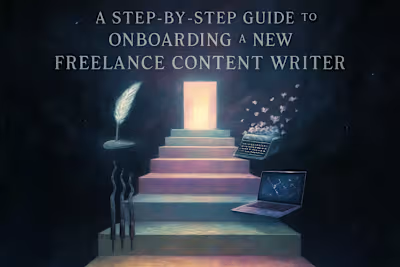Where to Hire Content Writers in 2025: Beyond the Usual Job Boards

Where to Hire Content Writers in 2025: Beyond the Usual Job Boards
1. Independent Freelancer Platforms
Why Choose an Independent Platform?
How to Effectively Use These Platforms
2. Niche Communities and Slack Channels
Finding Industry-Specific Groups
Best Practices for Posting in Communities
3. Professional Social Networks
Leveraging LinkedIn Search
Engaging with Writers' Content
4. Referrals and Your Professional Network
Asking for Recommendations
Making Your Search Successful
References
Where to Hire Content Writers in 2025: Beyond the Usual Job Boards
Finding talented content writers feels harder than ever. You post on job boards, sift through hundreds of applications, and still struggle to find someone who truly gets your brand voice. Sound familiar? The good news is that the best writers often aren't hanging out on traditional job sites anymore. They're building communities, showcasing work on specialized platforms, and connecting through professional networks.
This guide reveals where to find skilled writers who can actually deliver what you need. Whether you're ready to hire expert content writers today or still figuring out writing a great job description, knowing where to look makes all the difference. And once you find potential candidates, understanding how to interview potential candidates helps you pick the perfect match.
1. Independent Freelancer Platforms
Traditional freelance marketplaces often feel overwhelming. You're competing with thousands of other job posts while writers race to the bottom on pricing. Independent platforms flip this model completely. They focus on quality over quantity, giving you access to professional writers who take their craft seriously.
These platforms work differently than the massive marketplaces you might know. Instead of endless bidding wars, you get direct access to curated talent. Writers showcase their best work, client testimonials, and specific expertise. You can see exactly what they've created before reaching out.
Why Choose an Independent Platform?
The biggest advantage? No middleman fees eating into budgets. Platforms like Contra use commission-free models, meaning writers keep what they earn. This attracts higher-quality professionals who value their work appropriately. You're not competing with clients offering $5 per article.
Direct communication changes everything too. You message writers directly, discuss projects openly, and build relationships without platform restrictions. Many independent platforms also verify portfolios and experience, saving you hours of vetting time.
Think about it this way: would you rather sort through 200 generic proposals or browse 20 carefully curated portfolios from writers who specialize in your industry? The choice becomes pretty clear.
How to Effectively Use These Platforms
Success on independent platforms starts with being specific. Use search filters to find writers with your exact needs. Looking for SaaS content? Filter by that expertise. Need someone who understands B2B sales cycles? Search for that background.
When you find interesting profiles, actually read them. Writers put effort into showcasing their best work and explaining their process. Look for:
Portfolio pieces similar to what you need
Client testimonials mentioning qualities you value
Clear communication style in their profile description
Relevant industry experience or certifications
Your outreach matters too. Skip generic messages like "I have a writing project." Instead, mention specific portfolio pieces you liked. Explain your project clearly. Share your budget range upfront. Writers appreciate transparency and respond better to thoughtful messages.
Set up your company profile completely. Writers research potential clients just like you research them. A professional profile with clear company information builds trust immediately.
2. Niche Communities and Slack Channels
Writers don't just write—they connect with other writers. They share tips, discuss industry trends, and yes, talk about job opportunities. These communities offer something job boards can't: access to engaged professionals who are passionate about their craft.
The beauty of niche communities lies in their specificity. A general "writers wanted" post might get lost in the noise. But posting in a community of healthcare content writers when you need medical articles? That's targeting at its finest.
Finding Industry-Specific Groups
Start your search where writers in your industry naturally gather. Facebook groups remain surprisingly active for writers. Search for terms like "B2B content writers," "Tech content creators," or "Finance copywriters." You'll find groups with thousands of members sharing resources and opportunities.
Slack communities have exploded in recent years. Superpath serves B2B writers specifically. The Freelance Writers Den connects serious professionals. Content + UX brings together writers focused on user experience. Each community has its own culture and specialties.
Don't overlook Reddit either. Subreddits like r/freelancewriters or r/contentmarketing host daily discussions. Industry-specific subreddits often have writers lurking too. A post in r/SaaS might connect you with writers who truly understand software marketing.
LinkedIn groups still exist and thrive in certain niches. Search for groups related to content marketing, copywriting, or your specific industry. Active groups often have dedicated job posting days or sections.
Best Practices for Posting in Communities
Respect comes first in any community. Read the rules before posting anything. Many groups have specific days for job posts or dedicated channels. Posting outside these guidelines gets you banned fast.
Your post should offer value, not just ask for it. Share your budget range—writers hate mystery budgets. Explain what makes your project interesting. Maybe you're working on cutting-edge AI content or building a resource that genuinely helps people. Writers want meaningful work, not just paychecks.
Here's what works:
Clear project description with scope
Transparent budget or rate range
Realistic timeline expectations
What makes your company interesting to write for
Specific application instructions
Avoid these community killers:
"Looking for passionate writers" (everyone says this)
"Great exposure opportunity" (means no pay)
"Simple writing tasks" (usually aren't simple)
Bulk posting the same message everywhere
Engage genuinely with responses. Thank people for applying. Answer questions promptly. Even if someone isn't right for this project, they might be perfect for the next one. Building relationships in communities pays dividends long-term.
3. Professional Social Networks
LinkedIn transformed from a resume database into a content powerhouse. Writers showcase their expertise through articles, posts, and engagement. This visibility makes finding the right writer easier than ever—if you know how to look.
The platform's real power lies in seeing writers in action. You can read their articles, see how they engage with others, and gauge their expertise before making contact. It's like an always-on portfolio combined with professional networking.
Leveraging LinkedIn Search
LinkedIn's search function is incredibly powerful when used correctly. Start with job titles, but think beyond "content writer." Try variations like:
"B2B content strategist"
"SaaS copywriter"
"Technical content creator"
"Healthcare content specialist"
"[Your Industry] writer"
Boolean searches unlock even more possibilities. Use quotes for exact phrases. Add AND between terms to narrow results. Try "content writer" AND "fintech" AND "remote" to find exactly what you need.
The filters make searching even more precise. Filter by location if you need specific time zones. Use the "current company" filter to find writers at similar companies or agencies. The "connections" filter helps you find writers already in your extended network.
Don't ignore the "Content" search option. Writers who publish regularly on LinkedIn demonstrate their expertise publicly. Search for articles about your industry topics. The writers creating quality content about your field already understand it deeply.
Engaging with Writers' Content
Finding writers is just step one. How you approach them matters more. Start by following writers whose work impresses you. Engage genuinely with their posts—add thoughtful comments, not just "Great post!" reactions.
When you see a particularly insightful article, share it with your network and tag the writer. Explain what you found valuable. This builds rapport before any business discussion. Writers remember people who appreciate their work.
After a few genuine interactions, send a personalized connection request. Reference specific content they created. Mention what resonated with you. Only after connecting should you bring up potential work opportunities.
Your outreach message should be personal and specific. Try something like: "Hi Sarah, I've been following your articles about AI in healthcare, especially your piece on HIPAA compliance for AI tools. Your technical accuracy while keeping things readable is exactly what we need for our health tech blog. Would you be open to discussing some upcoming content projects?"
This approach takes more time than mass messaging, but the response rate is dramatically higher. Writers can tell when someone actually read their work versus sending template messages.
4. Referrals and Your Professional Network
Sometimes the best writers never publicly advertise their services. They're busy with client work, getting steady referrals, and don't need to hustle for new projects. Your professional network can unlock access to these hidden gems.
Referrals bring built-in trust. When a colleague recommends a writer, they're putting their reputation on the line. This social proof means more than any portfolio or testimonial. Plus, referred writers often come with insights about working style, communication preferences, and potential challenges.
Asking for Recommendations
The key to getting good referrals? Be specific about what you need. "Know any good writers?" yields generic responses. Instead, try: "I'm looking for a writer who can explain complex financial concepts to small business owners. Someone who's worked with fintech companies would be ideal. Do you know anyone who fits?"
Cast a wide net across your network:
Marketing colleagues at other companies
People in your industry Slack groups or forums
Former coworkers who've hired writers
Your current writers (they often know others)
Industry consultants or agencies
LinkedIn makes asking for recommendations easy. Post about your specific needs and watch referrals flow in. People love helping their network, especially when you're clear about requirements.
When someone provides a referral, make it easy for them. Ask:
What projects did they work on together?
What was the writer's strongest skill?
Any communication preferences or quirks?
Would they hire them again?
This information helps you approach the writer appropriately and sets realistic expectations.
Follow up with both the referrer and writer after initial contact. Let them know how it went. If you hire the writer, thank the referrer publicly. If it doesn't work out, still express gratitude. This encourages future referrals.
Consider creating a simple referral system. Some companies offer finder's fees or donate to charity when referrals lead to hires. Even a thoughtful thank-you note makes people more likely to help again.
Making Your Search Successful
Finding great writers isn't about using just one channel. The best approach combines multiple strategies. Maybe you find your lead writer through a referral, your blog contributors on LinkedIn, and specialized freelancers through niche communities.
Start with the channel that makes most sense for your immediate needs. Need someone tomorrow? Independent platforms offer the fastest path to quality. Building a long-term content team? Invest time in community relationships and LinkedIn networking.
Remember that great writers have options. They're evaluating you just as much as you're evaluating them. Make your opportunity stand out by being clear about projects, respectful of their expertise, and transparent about expectations.
The landscape for finding writers keeps evolving. What worked in 2020 might feel outdated now. Stay flexible, keep experimenting with new channels, and always prioritize quality relationships over quick transactions. Your content—and your business—will thank you for the extra effort.
References
Like this project
Posted Jun 15, 2025
Stop searching in the wrong places. Discover the best platforms, communities, and networks to hire talented freelance content writers who can elevate your brand.









